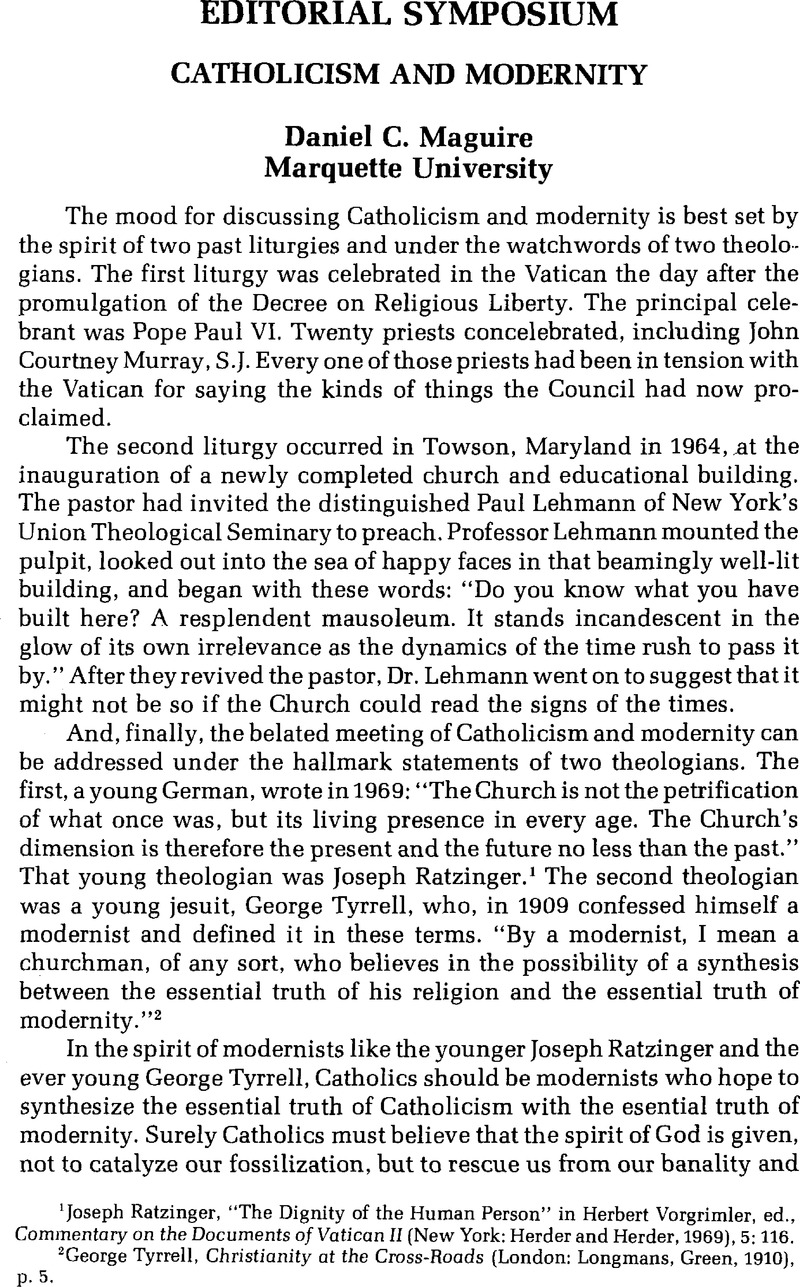No CrossRef data available.
Published online by Cambridge University Press: 09 September 2014

1 Ratzinger, Joseph, “The Dignity of the Human Person” in Vorgrimler, Herbert, ed., Commentary on the Documents of Vatican II (New York: Herder and Herder, 1969), 5:116.Google Scholar
2 Tyrrell, George, Christianity at the Cross-Roads (London: Longmans, Green, 1910), p. 5.Google Scholar
3 Daly, Gabriel, “Catholicism and Modernity,” Journal of the American Academy of Religion 53/4 (December 1985), 774.Google Scholar
4 Ibid.
5 Ibid., p. 775.
6 Daly, Gabriel, Transcendence and Immanence: A Study in Catholic Modernism and Integralism (Oxford: Clarendon Press, 1980), p. 117.Google Scholar
7 Petre, Maude D., ed., Autobiography and Life of George Tyrrell (London: E. Arnold, 1912), p. 337.Google Scholar On the term “modernist,” Gabriel Daly says: “The term ‘modernist’ is inescapably imprecise. It is taken here to apply to any Roman Catholic writer whose thinking and methodology led him to challenge the over-all philosophico-theological schema, or any significant element therein, of the then prevailing neo-scholastic conception and method of doing philosophy and theology” (Transcendence and Immanence, p. 5). He adds that “we should demand of any theologian who refers to ‘modernism’ that he show the provenance of his understanding of the term. If he accepts the definition of modernism provided by Pascendi, let him say so without equivocation and we shall know where we stand with him” (ibid., p. 4).
8 Gilkey, Langdon, Catholicism Confronts Modernity: A Protestant View (New York Crossroad, 1975), p. 29.Google Scholar
9 Ibid.
10 Ibid., p. 10; see also p. 15.
11 Allocution Iamdudum cernimus, March 18, 1861, Propositions 37, 61, 76, 80. The Syllabus seu Collectio Errorum Modernorum, in Denzinger, Henrici, Enchiridion Symbolorum (Freiburg: Herder, 1953)Google Scholar, n. 1780.
12 See Principe, Walter H., “Bishops, Theologians, and Philosophers in Conflict at the Universities of Paris and Oxford: The Condemnations of 1270 and 1277,” Proceedings of the Catholic Theological Society of America, 40 (1985), 116–17.Google Scholar
13 Ibid., p. 117. See especially note 8.
14 Niebuhr, Reinhold, Leaves from the Notebooks of a Tamed Cynic (New York: Harper and Row, 1957), p. 167.Google Scholar
15 Baum, Gregory, The Priority of Labor (New York: Paulist, 1982), p. 38.Google Scholar
16 Ibid., p. 40.
17 Gilkey, p. 81.
18 Daly, , “Catholicism and Modernity,” p. 778.Google Scholar
19 Ibid.
20 Brown, Raymond, The Community of the Beloved Disciple (New York: Paulist, 1979), pp. 191, 82–83.Google Scholar
21 Hengel, Martin, “James the Lord's Brother—The First ‘Pope’?” (an unpublished lecture given at Trinity College, Dublin, November 1985).Google Scholar
22 Ullman, Walter, The Growth of Papal Government in the Middle Ages (London: Methuen, 1955), p. 7.Google Scholar
23 Ullmann, Walter, A Short History of the Papacy in the Middle Ages (London: Methuen, 1972), p. 22.Google Scholar
24 Ibid.
25 Dodd, C. H., The Founder of Christianity (New York: Macmillan, 1970), p. 93.Google Scholar
26 Gilkey, pp. 15-16.
27 Augustine, , Writings in Connection with the Donatist Controversy in The Works of Aurelius Augustine 3, ed. Dods, M. (Edinburgh: T & T. Clark, 1872), p. 35.Google Scholar
28 Kee, Alistair, Constantine vs. Christ: The Triumph of Ideology (London: S.C.M. Press, 1982), p. 170.Google Scholar
29 Ruether, Rosemary Radford, “Crises and Challenges of Catholicism Today,” America 54 (March 1, 1986), 154.Google Scholar
30 Laeuchli, Samuel, Power and Sexuality: The Emergence of Canon Law at the Synod of Elvira (Philadelphia: Temple University Press, 1972), p. 115.Google Scholar
31 Ibid., p. 90.
32 Ibid., p. 85, note 1.
33 Ibid., p. 76.
34 Ibid., p. 82.
35 Ibid., pp. 98-100, p. 104.
36 Curran, Charles E., “Abortion: Law and Morality in Contemporary Catholic Theology,” Jurist 33 (1973), 162–83;Google ScholarPubMedMcCormick, Richard A., “Notes on Moral Theology,” Theological Studies 35 (June 1974), 338.CrossRefGoogle ScholarPubMed Both Curran and McCormick argue that the phrase “other values proportionate to life” “must be interpreted in a way consistent with our assessment of the values justifying the taking of extrauterine life.” In just war theory, many values were considered proportionate to life, and indeed more than proportionate to life. Curran and McCormick opened up a large door here through which many choices for abortion could enter and be considered moral. Their position here is considerably more liberal than the famous ad in The New York Times of March 7,1984 which caused such a stir. The ad merely held that there is a legitimate diversity of opinion within Catholicism on the morality of abortion.
37 Tauer, Carol A., “The Tradition of Probabilism and the Moral Status of the Early Embryo,” Theological Studies 45 (March 1984), 3–33.CrossRefGoogle Scholar
38 Brunner, Emil, Justice and the Social Order (London: Lutterworth, 1945), p, 7.Google Scholar
39 Marcuse, Herbert, One-Dimensional Man (Boston: Beacon, 1964), p. 109.Google Scholar
40 Ruether, p. 153.
41 Thomas Aquinas, Summa Theologiae, I-II, q. 106, a..1, ad2.
42 It adds something to the message of this essay to note that it was originally given as a lecture at Boston College on March 12, 1986. In the summer of 1985 four Catholic universities (colleges) cancelled agreements with me to give lectures or classes because of my views on abortion. The four were: Boston College, Villanova University, St. Scholastica (Duluth), and St. Martin's (Lacey, Washington). In no case was I scheduled to speak on abortion and yet in each case abortion was cited as the cause of my disinvitation. The Faculty Senate at Boston College then invited me to speak on any topic of my choosing in order to demonstrate academic freedom on that campus. The four cancellations illustrate the interiorization of oppression that I spoke of in this essay.